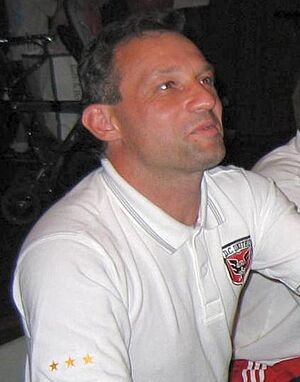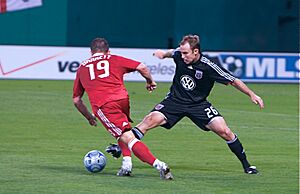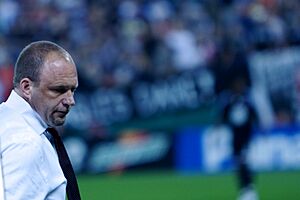History of D.C. United facts for kids
D.C. United is a professional soccer club based in Washington, D.C.. It's one of the first teams in Major League Soccer (MLS), which is the top soccer league in the United States. The club was created because FIFA awarded the 1994 FIFA World Cup to the U.S. As part of hosting the World Cup, the United States Soccer Federation promised to start a professional soccer league.
MLS was founded in December 1993, aiming to start games in 1996. Washington, D.C. was chosen in June 1994 as one of the first eight cities to get a team. D.C. United's name, colors, and logo were revealed in October 1995. The team first played at RFK Stadium and later moved to their current home, Audi Field, in 2018.
D.C. United played its first match in April 1996. The team quickly became very successful, winning three of the first four MLS Cup championships. Between 1996 and 1999, they also won the Supporters Shield (for the best regular season record) twice, the U.S. Open Cup (a domestic tournament) once, the CONCACAF Champions' Cup (a continental championship) once, and the Copa Interamericana (an intercontinental championship) once. This amazing success made D.C. United known as the league's "flagship franchise" in its early years.
Contents
History of Soccer in Washington, D.C.
Before D.C. United, other soccer teams played in Washington, D.C. The Washington Diplomats played in different leagues from 1974 to 1991. They won one championship in 1988. The Diplomats mostly played at RFK Stadium, just like D.C. United would later.
Early Years (1995–1999)
Starting a New Team
Before the 1994 FIFA World Cup, the United States Soccer Federation helped create a new professional soccer league. On June 15, 1994, Major League Soccer picked Washington, D.C. as one of the first cities to host a team. Twenty-two cities applied, but only seven were chosen at first.
Once Washington got a team, they needed a name. Early ideas included "Spies," "Americans," and "Eagles." But the team's owners decided on "D.C. United." The name "United" was inspired by famous European clubs like Manchester United. It also showed that the team was in the capital of the United States.
The team's colors and first logo were announced on October 17, 1995. D.C. United's main colors are black and white, but they are often called the "Black-and-Red." Red is used on their home jerseys, and white is for their away uniforms. The three stripes on the shoulders are from Adidas, their uniform maker. The team's shirt sponsor is Leidos. In 2011, they added a red third jersey. White and red are also the colors of the flag of Washington, D.C..
The team's first logo, used in 1996, had the name "D.C. United" above a black bald eagle. The eagle held three soccer balls over three white stars. These stars and balls were meant to represent the three areas of the Washington Metropolitan Area: D.C., Virginia, and Maryland. The eagle, being the national bird, showed the team's speed and power. This logo was updated in 1998. The new design had the eagle facing left, and the three stars were replaced by three raised wing feathers. A gold star and soccer ball in the center of the eagle showed their win in the first MLS Cup in 1996. The logo can also have four gold stars above it, one for each MLS Cup the team has won.
Immediate Success (1996–1999)
1996 Season Highlights
D.C. United played its first MLS game on April 6, 1996, against the San Jose Clash. San Jose scored the first goal in league history, and United lost. They lost their next three games too, starting in last place.
However, United turned things around and made it to the playoffs with an even record of 16 wins and 16 losses. They won the Eastern Conference title by beating the Tampa Bay Mutiny. In the first-ever MLS Cup championship, D.C. United faced the Los Angeles Galaxy. United was down 0–2 but came back to win 3–2 in overtime! This was the first league championship for a Washington, D.C. sports team in four years. United also won the U.S. Open Cup that year, beating Rochester 3–0. This made them the first American professional soccer club since 1932 to win both the league and domestic cup championships in the same year.
1997 Season Highlights
In 1997, D.C. United continued its success by winning both the MLS Cup and the Supporters' Shield. This "double" has only happened five times in MLS history. Besides MLS, the team also played in the U.S. Open Cup and the CONCACAF Champions' Cup.
On August 12, 1997, United played its first international game against United Petrotrin from Trinidad and Tobago. A late goal by Marco Etcheverry gave United a 1–0 win. In the CONCACAF semifinals, they lost to the Los Angeles Galaxy.
1998 Season Highlights
Winning the 1997 MLS Cup meant D.C. United played in the CONCACAF Champions' Cup again in 1998. They wanted to win a North American title. After a big 8–0 win against Joe Public, United beat Club León 2–0 in the semifinals.
In the 1998 final, United played against Deportivo Toluca from Mexico. A goal from United's Eddie Pope in the 41st minute gave them their first CONCACAF title. D.C. United was the first American and MLS club to win a CONCACAF title.
United's success continued in the 1998 Copa Interamericana. This was a special series between the CONCACAF and CONMEBOL champions to find the best club in the Americas. United played against Vasco da Gama from Brazil. Vasco da Gama won the first game 1–0. But in the second game, United won 2–0, winning the series 2–1 overall. This was the last Interamericana title ever.
Even with two major international titles in 1998, United didn't win an MLS trophy that year. They lost to the Chicago Fire 0–2 in the 1998 MLS Cup final.
1999 Season Highlights
Bruce Arena was D.C. United's coach from the beginning. But in October 1998, he left to coach the U.S. men's national team. Thomas Rongen took over as coach. Rongen had won Coach of the Year before. He led United to another successful season and a win in the 1999 MLS Cup.
Rebuilding the Team (2000–2003)
After coach Arena left, the team's success started to decline. Even though they won the MLS Cup in 1999, the league changed its rules about player salaries. D.C. United had to let go of several key players to stay within the salary limits. They replaced them with younger, less experienced players.
This "new look" United team failed to reach the MLS Cup in 2000 and didn't even make the playoffs. They finished second to last in the league. In 2001, they finished last in their conference.
After two tough seasons, the team fired coach Rongen. They hired Ray Hudson, who had been a successful coach for another MLS team. But Hudson also struggled with D.C. United. In 2002, they finished last in the Eastern Conference for the third year in a row. In 2003, D.C. United finally made the playoffs again, but they lost in the first round. Hudson was fired after the 2003 season, and Piotr Nowak became the new coach.
Second Golden Age (2004–2007)
Fourth MLS Cup Victory
The years under coach Piotr Nowak were some of the best for D.C. United since their early dominance. They won an MLS Cup, two Supporters' Shields, and an Open Cup title. This nearly doubled their collection of trophies in just four years.
Nowak became head coach on February 18, 2004. That year also saw the arrival of a young soccer star, Freddy Adu, who was only 14 years old. He was the youngest professional athlete signed to an American sports league since 1887. Adu's arrival brought a lot of attention and huge crowds to United's games.
United's first season under Nowak had some injuries early on. But a strong finish, helped by midfielder Christian Gómez, pushed United into the 2004 playoffs. They beat the New England Revolution in a thrilling game that went to penalty kicks. This game is often called one of the best in MLS history. United then defeated the Kansas City Wizards to win their fourth MLS Cup.
In the MLS Cup 2004 final, United played the Kansas City Wizards. Kansas City scored first, but United quickly scored three goals in seven minutes! Alecko Eskandarian scored two goals, and a Wizards player accidentally scored an own goal. United led 3–1 at halftime. In the second half, United's Dema Kovalenko got a red card, meaning he had to leave the game. This was the first time a player was ejected from an MLS Cup final. Kansas City scored a penalty kick, making it 3–2. Even though United was playing with one less player, they defended well and held on to win their fourth MLS Cup title.
Winning Consecutive Shields
After winning the 2004 MLS Cup, D.C. United entered what some call their "second golden age." Between 2005 and 2008, they won a U.S. Open Cup in 2008 and two Supporters' Shields in 2006 and 2007. United was the first MLS club to win the Supporters' Shield two years in a row. These Shield wins also qualified them for the CONCACAF Champions' Cup, where they reached the semifinals twice.
The 2006 season was one of United's best regular seasons ever. They scored the most goals in the league and gave up the second-fewest. They finished with 55 points, beating FC Dallas to win the Supporters' Shield.
Tougher Times (2008–2011)
Domestic Cup Success, Playoff Struggles
For fans and the media, 2008 marked a downturn for the team. D.C. United failed to win the Supporters' Shield for a third year in a row. They also missed the playoffs for the first time since 2002, finishing low in the league standings.
Their struggles also showed in international play. As 2007 Supporters' Shield winners, United played in the first CONCACAF Champions League. This tournament features top clubs from North and Central America. United had a tough time, losing most of their group games and finishing last in their group.
However, United did very well in the Lamar Hunt U.S. Open Cup in 2008. They won their first Open Cup title in 12 years, beating the Charleston Battery 2–1. This was their first Open Cup win since their first season in 1996. The U.S. Open Cup is a tournament open to all professional and amateur soccer clubs in the U.S.
The 2009 season looked promising for United, as they were in a playoff spot for most of the year. They also reached the U.S. Open Cup final for the second year in a row. But they lost 2–1 to the Seattle Sounders FC.
United also played in the 2009–10 CONCACAF Champions League because they won the 2008 U.S. Open Cup. They did better this time, winning three games, drawing one, and losing two. But they still didn't make it to the quarterfinals.
2010 Season
After missing the playoffs for two years, coach Tom Soehn resigned. D.C. United hired Curt Onalfo, a former United player, as the new head coach. Ben Olsen, another former United player, became an assistant coach.
Onalfo's time as coach was short and not successful. The 2010 season was the worst in the club's history. The team only won six games out of 30, losing 20. They also scored only 22 goals, which was the lowest total in MLS regular season history. Attendance at games also dropped. Onalfo was fired in August 2010, and Ben Olsen took over as interim coach. Olsen led the team to a slightly better record in the last 10 games.
Despite the poor league performance, the team had a good run in the 2010 U.S. Open Cup. They reached the semifinals before losing to the Columbus Crew.
Ben Olsen Era (2012–2020)
After the tough 2010 season, D.C. United made many changes to its team and management. They signed interim coach Ben Olsen to a three-year contract. They also brought in new players like Josh Wolff, Joseph Ngwenya, and Charlie Davies.
2012 Season
In the summer of 2012, new partners Erick Thohir and Jason Levien joined the club's ownership group. Their goals included making D.C. United known globally and, most importantly, getting a new soccer stadium for the team.
On October 21, 2012, D.C. United beat the Columbus Crew 3–2, returning to the MLS Cup Playoffs for the first time in five years. They finished the regular season strong, with five wins and two draws in their last seven games. Coach Ben Olsen used a defensive strategy, focusing on getting one clear chance to win a game.
In the playoffs, United beat their rival New York Red Bulls in the conference semifinals. They then went to the Eastern Conference Finals but lost to the Houston Dynamo. The playoff series against New York was affected by Hurricane Sandy, which caused game delays and changes.
2013 Season
D.C. United's surprising success in 2012 was followed by the worst season in club history in 2013. They set league records for how few games they won (only 3 out of 34) and how few goals they scored.
However, despite their struggles in the league, D.C. United did win their first title since 2008. They won the 2013 U.S. Open Cup tournament, beating Real Salt Lake 1–0. This win meant D.C. United would return to the CONCACAF Champions League in 2014 after a five-year break.
2014 Season
After the 2013 season, the team changed many players again. They brought in experienced players like Bobby Boswell, Sean Franklin, Fabian Espindola, Davy Arnaud, Jeff Parke, Eddie Johnson, and Chris Rolfe.
In 2014, D.C. United had the biggest turnaround in MLS history. They went from the worst season ever to winning the regular season Eastern Conference Championship! Coach Ben Olsen was named the MLS Coach of the Year, and goalie Bill Hamid was named the best goalkeeper in the league. The team also did very well in the 2014-15 CONCACAF Champions League, winning all their group games.
The year 2014 ended on a high note for the team. The government of the District of Columbia approved a plan to buy land for a new stadium at Buzzard Point. The team and its owners would build and pay for the new stadium.
Honors
International Titles
- Copa Interamericana
- Winners (1): 1998
- CONCACAF Champions League
- Winners (1): 1998
Domestic Titles
- U.S. Open Cup
- Winner (3): 1996, 2008, 2013
League Titles
- MLS Cup
- Winner (4): 1996, 1997, 1999, 2004
- MLS Supporters' Shield
- Winner (4): 1997, 1999, 2006, 2007
- MLS Eastern Conference
- Winners (Regular Season) (6): 1997, 1998, 1999, 2006, 2007, 2014
- Winners (Playoff) (5): 1996, 1997, 1998, 1999, 2004
Other Awards
- Atlantic Cup
- Winner (11): 1996, 1998, 1999, 2002, 2004, 2005, 2006, 2007, 2008, 2009, 2012, 2014, 2016, 2021
- Carolina Challenge Cup
- Winners (4): 2010, 2011, 2012, 2014
- ATX Pro Challenge
- Winner (1): 2015
- Capital Cup
- Winner (2): 2021, 2022
Images for kids
 | Selma Burke |
 | Pauline Powell Burns |
 | Frederick J. Brown |
 | Robert Blackburn |





